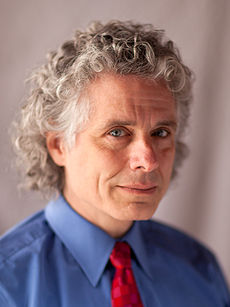Steven Pinker
 Steven Arthur Pinker
Steven Arthur Pinker
September 18, 2012
On this date in 1954, Steven Pinker, who, according to
the Guardian, has "the looks of a rock star, a fondness for early Woody
Allen movies, and a world-class reputation as a scientist and writer,"
was born in Montreal's Anglophone Jewish community. Pinker earned a
bachelor's with first class honors in experimental psychology from
McGill University (1976) and a Ph.D. in experimental psychology from
Harvard in 1979. Pinker, published extensively in the fields of
linguistics and experimental psychology, taught at MIT for 21 years and
now is Johnstone Professor of Psychology at Harvard. Among his numerous
books and bestsellers are The Language Instinct (1994), How the Mind Works (1997), The Blank Slate: The Modern Denial of Human Nature (2002), and The Stuff of Thought: Language as a Window into Human Nature
(2007). His writings have frequently appeared in Time, The New
Republic, The New York Times and many other magazines and newspapers.
Pinker has won numerous prizes for his books (including the Los Angeles
Times Science Book Prize, the Eleanor Maccoby Book Prize and the William
James Book Prize three times) and research (including awards from the
American Psychological Association, the Royal Institution of Great
Britain and the National Academy of Sciences).
In addition to receiving six honorary doctorates, Pinker is a Humanist
Laureate, 2006 Humanist of the Year, and the Honorary President of the
Canadian Psychological Association. He is an elected fellow of the
American Academy of Arts & Sciences, the American Association for
the Advancement of Science, and the Neuroscience Research Program. The
UK Guardian called him "Science's agent provocateur," and Newsweek
listed him in the top "One Hundred Americans for the Next Century"
(1995). Of the same caliber as intellectual great Noam Chomsky,
he made Time's 2004 list of "World's 100 Most Influential People." A
long-time critic of creationism, Pinker wrote in a Boston Globe op-ed,
"Virtually no scientist takes 'intelligent design' seriously, and in the
famous Dover, Pa, trial in 2005, a federal court ruled that it is
religion in disguise" (July 20, 2009). In a Salon.com interview, Pinker
and his wife Rebecca Newberger Goldstein, said they were proud atheists
and Pinker continued: "Atheists are the most reviled minority in the
United States, so it's no small matter to come out and say it. . . . I
would put faith in the same category [as alchemy] because faith is
believing something without a good reason to believe it" (Oct. 15,
2007). He fought and won against a proposal at Harvard to require a
course on "Reason and Faith." On this, Pinker wrote, "[U]niversities are
about reason, pure and simple. Faith—believing something without good
reasons to do so—has no place in anything but a religious institution,
and our society has no shortage of these. Imagine if we had a
requirement for 'Astronomy and Astrology' or 'Psychology and
Parapsychology' " ("Less Faith, More Reason," in The Harvard Crimson,
Oct. 27, 2006). Pinker, who has been a guest on Freethought Radio, was awarded FFRF's 2004 Emperor Has No Clothes Award
for his plain speaking on religion and in appreciation of his
forthright espousal of his rational views. The evolutionary psychologist
is a member of the Foundation's honorary board.
"I was never religious in the theological sense. I never outgrew my conversion to atheist at 13."
— Steven Pinker quoted in "Steven Pinker: the mind reader," in The UK Guardian, Nov. 6, 1999
Compiled by Bonnie Gutsch - www.ffrf.org
No comments:
Post a Comment